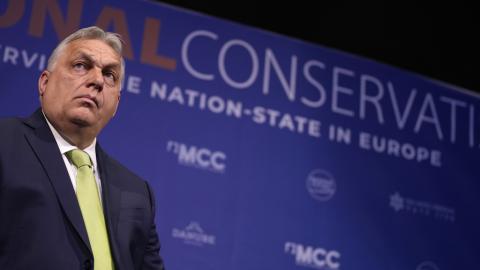Will Supreme Court Try to Redefine Sex? LGBT Cases Pitted Against Religious Freedom & Rights of Women
Roger Gannam, assistant vice president of Legal Affairs at Liberty Counsel, appeared on Tuesday's edition of CBN's Newswatch to discuss the two briefs his firm filed in support of the employers in this case.
WASHINGTON – On Tuesday, the US Supreme Court heard three major cases that could affect a wide swath of the American population.
At the core of these cases is what does the word "sex" means when it comes to law. In 1964, when it first became illegal to discriminate on the basis of sex, it meant "male" and "female." Now, at least one side in these cases is arguing it should be a bit more complicated: gender identity and sexual orientation should be included.
The cases involve two homosexuals and one transgender fired from their jobs. Gerald Bostock is one of the gay men.
He said outside the court after his case was heard, "Millions and millions of people go to work every day fearful for being fired for who they are, how they identify and who they love. And that's wrong."
One Lost a Job, One Could Lose a Business
One case involves Aimee Stephens, who was known as Anthony Stephens when she worked at Tom Rost's funeral homes in Michigan. Stephens was fired for saying he planned to start wearing dresses instead of the suits required of men at the funeral home.
"What happened to me was wrong and hopefully we can fix that and correct it from this point on," Stephens said after her case was heard.
Rost is worried his business will be wiped out if the high court rules against him.
"Now we face severe penalties because the ACLU is trying to change the law out from under us," he said.
Homosexuals and transgenders in these cases are arguing they need to be treated equally in the eyes of the law. But the other side is arguing beware the law of unintended consequences. Especially worried are women who say they're going to lose some rights while these other folks are gaining them.
"And that poses massive ramifications for millions of Americans across the country," Christiana Holcomb of Alliance Defending Freedom told CBN News.
John Bursch argued for Harris Funeral Homes and said of redefining the term "sex" in law, "It's going to have consequences for millions of women and girls. Justice Alito, in particular, brought up the example of sports teams and how if you redefine sex, then a women's team doesn't have the ability to keep a man who identifies as a woman from being on the team and taking the girls' spots."
Could Be Trapped with Men Saying They're Transgender
Penny Nance of Concerned Women for America pointed out women in prisons and women's shelters are scared they'll be forced into intimate quarters with transgender men.
She told CBN News, "Women in domestic shelters are filing suit over the fact that suddenly these women who have been so hurt and now are having to share showers and common space with men. So this is a serious issue."
Holcomb stated, "The Civil Rights Act was designed to insure that specifically women were free of sex discrimination. What the other side is attempting to do would actually undo nearly 60 years of progress for women under these civil rights laws."
Bursch said the justices seemed aware of the damage changing the definition of sex could have on American life.
Justices Alert to the Dangers
Bursch told assembled reporters outside the court, "The justices across the bench were troubled by the fact that the ACLU's argument would eliminate all sex-specific policies in the workplace, whether they be sex-specific showers, dress codes, restrooms, sports teams: every single one of those things would have to go."
After winning a number of cases in the last few years, the homosexual and transgender side might have thought they'd have an easy time with this court. But apparently not if the toughness of the questions the justices were asking of their lawyers is any indication.
Those arguing against adding gender identity and sexual orientation to the word sex in law argued the justices shouldn't even be hearing these cases. They, and some of the justices as well, pointed out Congress right now is working on what the definition of sex is when it comes to law. And that the courts should get out of the way and let Congress do its job.
In a statement Stephanie Taub, senior counsel of First Liberty Institute said, "Redefining protected classes in the law could have serious ramifications for religious liberty, and in particular, religiously affiliated organizations. It is vitally important that federal employment discrimination law is not rewritten to hinder the religious freedom of churches, synagogues, mosques, religious schools, religious charities, and all other nonprofit religious ministries. The Supreme Court of the United States should avoid interpreting the law in any way that could imperil religious liberty."



